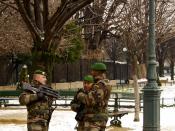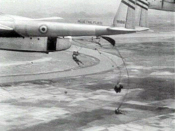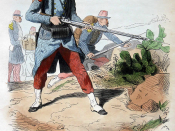During a time of foreign conquest and adventure there was a need for professional soldiers to protect a country's overseas empire. Of course that country had its own military, but that wasn't always enough for a safeguard of ones holdings. The English had great success in using natives of regions for protection of its empire such as the Gurkhas and Sikhs. The French came up with a concept that evolved into an elite fighting force that is world-renowned today. First, the French Foreign Legion was a way to get rid of foreigners and other unwanted people within France, Second it was a great way to defend it's overseas wealth, and last but not least is still today an instrumental piece of machinery to France's military.
In 1831 King Louis-Philippe authorized the raising of a legion. The royal intent was to clear France of foreign lay-abouts and criminals. The idea was to send them to North African posts where combat losses were high and living conditions unbearable.
The majority of officers were French but sixty percent of the enlisted men were foreigners. For the officers it was an embarrassment to be sent into the legion and they looked for anyway possible to return to France. The enlisted men on the other hand were there for another reason. Some were young men looking for adventure. Others criminals who were offered either jail time or service. Some the chronically unemployed or in other words the homeless who rather serve in the legion than be beggars. Others were men who deserted from other armies and decided they would like to return to their former career path. As already stated most of these men were foreigners. It is hard to tell whom most of these men really were, because most enlisted anonymously usually so they could hide from the law. For France this was a great way to defend its colonies. An old saying goes like this "Every dead legionnaire has spared the life of a Frenchman."ÃÂ Now do not get the wrong impression that the legion was just a hiding place for criminals or that they were not valued by France. From 1831 on they have had an impressive combat record.
To defend an empire is no easy task. Although the legion protected French colonial possessions well. From 1830-1850 there was continuos fighting with Arab revolutionaries. In 1848 they experienced the worst of the uprisings when the French monarchy was overthrown and the second republic set up. Word reached Africa and the Arabs decided with the change of power in France that now was the time for Rebellion. Within time the insurrection was put down. The legion had a tough time in Africa. Any time they went somewhere it was usually on foot. One of there mottoes was and still is today "March or Die."ÃÂ French forces also adopted the policy of remaining cooped up in Forts until needed. This as you can imagine was very boring and many posts were out in desolate areas. But from 1831-1962 the legion lived and fought in Africa. They have been back since then. As late as the year 1997. They have helped Chad fight Libyan funded insurgents and still deploy to Chad today. The French government still has strong ties to its former colonies in Africa. The legion is known for its actions in Africa but also was influential in South East Asia. In 1857 the Opium wars were the excuse France needed to get a foothold in Indochina. The legion fought pirates, rebels, and was there along with other French forces to keep the peace. The French bombarded DaNang in 1858 and seized Saigon in 1859 on the pretext of punishing the Vietnamese for persecution of Catholic priests. By 1867 France controlled almost all of Vietnam and controlled all of Cambodia. It was the legion's job to control these places militarily. For the most part service in Vietnam was good. Being assigned there in the legion was rewarding. There were servants who maintained the garrisons and they usually lounged around, but that would all change. From 1930-32 communist rebels led by Ho Chi Minh and others began an insurrection. They and the local populace were dealt with severely as this account states, "An unbridled army rabble, giving over to all its instincts, escaping almost completely from control of its leaders, now terrorizes the entire country. One steals, one rapes, one condemns and one executes as one pleases. The legionnaires enter the houses, take what pleases them, and attack women and young girls. For no reason, without proof, men, young people, are arrested and shot in cold blood, without trial. This is a real troop of pirates which has been set loose on the country." In the WWII years the Japanese controlled France's possessions in Indochina. French forces including legionnaires either fought the Japanese and were killed, most of them anyway or went along with the Vichy government of France and worked under the Japanese. After the war Ho Chi Minh returned and a war between his forces and French forces that began in November 1946 culminated into the Battle of Dien Bien Phu in which the legion was at the core of the French forces, but the French lost and so in May of 1954 French involvement in Vietnam was over.
The French Foreign Legion is still in action today. It has a standing force of 8,000 men. Its current pay is about $720 a month and they pick up any medical, dental, and clothing expenditures. After five years service you can become a French citizen. After twenty retire on a small pension. Anonymous enlistments are still allowed. It is a great way to seek adventure. Recent excursions have included peacekeeping duties in Bosnia and as a part of Operation Desert Storm. One thing is for sure though, at $720 a month you won't get rich as a legionnaire.





